Xi's visit to unveil new roadmap for China-Mongolia ties
Updated: 2014-08-19 00:43
(Xinhua)
|
||||||||
BEIJING -- Chinese President Xi Jinping will pay a state visit to Mongolia on Aug. 21-22, the first time that a Chinese head of state has visited Mongolia in 11 years, and also Xi's second solo overseas trip since he took office in March 2013.
Xi's visit will further promote the all-round cooperation between China and Mongolia, further optimize China's surrounding environment, and actively practice the "closeness, sincerity, sharing in prosperity, and inclusiveness" of China's neighborhood diplomacy.
Xi visited South Korea on July 3-4.
UPGRADING SINO-MONGOLIAN RELATIONS
This year marks the 65th anniversary of the establishment of the China-Mongolia diplomatic relationship, and the 20th anniversary of the amendment to the China-Mongolia Friendship and Cooperation Treaty. At this historic moment, it is important for Chinese and Mongolian leaders to decide how to draw up a new roadmap for Sino-Mongolian relations.
During the two-day visit, President Xi will hold talks with his Mongolian counterpart Tsakhiagiin Elbegdorj to determine the development direction as well as major tasks and basic ideas of their bilateral relations, which are expected to be elevated to a higher level.
Enhancing mutual trust and addressing each other's core interests and major concerns are a prerequisite for further developing political relations between the two neighbors. Experts believe that the two leaders will take a clear-cut stance on this issue.
"China will reaffirm its respect for the independence, sovereignty, territorial integrity and development path of Mongolia, as well as support Mongolia's nuclear-free status. Meanwhile, Mongolia will continue to support China's position on Tibet, Xinjiang and Taiwan," said Huang Jiakui, director of China's Mongolia Research Council.
Chinese Ambassador to Mongolia Wang Xiaolong told Xinhua that the further development of Sino-Mongolian relations is blessed with opportune timing, favorable conditions and popular support.
"The leaders, social media, intellectual elites and the general public of Mongolia have placed great hopes on President Xi's visit, considering it an important opportunity to overcome economic difficulties and to achieve long-term development," he said.
PROMOTING PRAGMATIC COOPERATION
Economic and trade cooperation is undoubtedly the cornerstone in China-Mongolia relations. During the visit, President Xi will work together with Mongolian leaders to explore effective ways to expand and deepen bilateral economic and trade relations.
Experts believe that the leaders of both countries are expected to follow the principle of "three-in-one and coordinated promotion" in the development of mineral resources, infrastructure construction and financial cooperation, to promote bilateral economic and trade cooperation to a higher level.
"China and Mongolia may focus on some important issues such as increasing bilateral trade volume, improving the structure of foreign trade and investment, promoting industrial upgrading, developing interconnection of railways, highways and electricity, as well as supporting cooperation in key areas and large-scale projects," Huang said.
Statistics indicate that China and Mongolia have a substantial base for further development in this area. China has been Mongolia's largest trading partner and investor in the past 10 years, with the bilateral trade volume reaching 6 billion U.S. dollars in 2013 -- nearly 20 times that in 2002 and more than half of Mongolia's total foreign trade.
In the future, geographical advantages and high complementarities will continue to be a favorable factor in their economic and trade cooperation.
China and Mongolia share 14 border crossings for exports and imports, with the advantage of less transportation distance and lower cost. China imports coal, oil, minerals, livestock and other primary products from Mongolia, while the electromechanical products, agricultural products, construction materials, and textiles from China are also popular in Mongolia.
"China is trying to achieve the Chinese dream. Mongolia is also at a crucial period of economic development, which indicates that there will be new contents in the economic and trade cooperation between the two countries," said Qu Xing, president of China Institute of International Studies.
Xi's upcoming visit will also further enhance mutual understanding between the peoples of China and Mongolia and promote lasting friendship between the two countries.
Experts believe that the Chinese and Mongolian leaders will encourage local governments, civil society and universities to carry out multi-level forms of cultural exchanges, and urge relevant departments to implement bilateral cooperation agreements and programs in the sectors of culture, education, science and technology.
With over a million Mongolians visiting China for tourism, education and medical treatment every year, A "China craze" has been aroused among the Mongolian youth. Mongolia also attracts a large number of Chinese tourists with its rich natural landscape. The two countries have announced the year 2014 as the "China-Mongolia Friendly Exchange Year."
"Communicating demands of the peoples of China and Mongolia is the booster to develop bilateral relations. After all, they are the protagonists in the exchanges of various fields," said the former Chinese Ambassador to Mongolia, Gao Shumao.
Related stories:
Developing ties with China top priority on Mongolia's agenda
- Major Mongolia deals poised to be signed
- Chinese president to visit Mongolia
- Developing ties with China top priority on Mongolia's agenda
- President Xi meets Prince Albert II of Monaco
- President Xi urges prevention of humanitarian crisis in Ukraine
- Chinese President Xi meets IOC chief Bach
- President Xi meets UN Secretary-General on hot issues
- President Xi: China to continue help to fight Ebola
- President Xi Jinping visits troops in Fujian
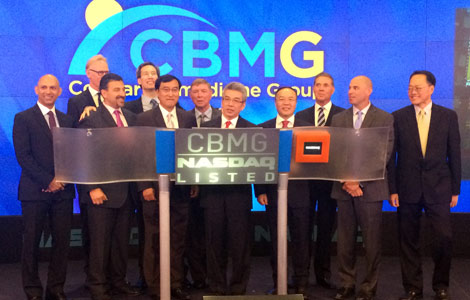
 Chinese biotech company rings closing bell at NASDAQ
Chinese biotech company rings closing bell at NASDAQ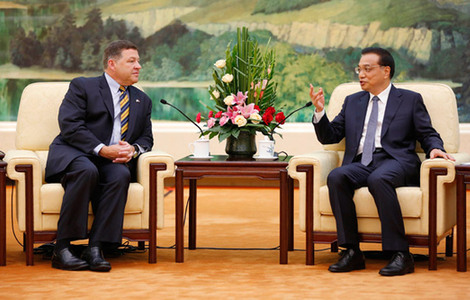
 China can upgrade US transport
China can upgrade US transport
 Jackie Chan's son detained for taking drug
Jackie Chan's son detained for taking drug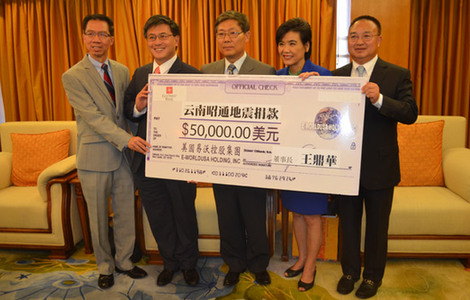
 California Chinese open pockets for quake relief
California Chinese open pockets for quake relief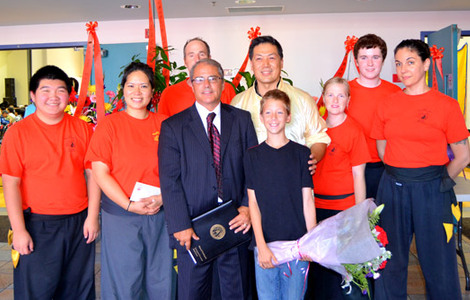
 Showing their skills
Showing their skills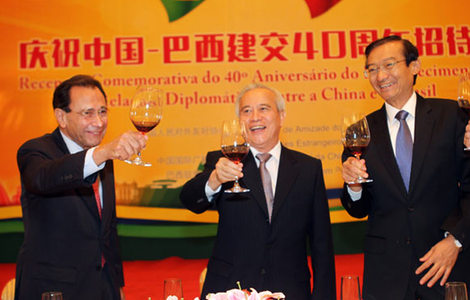
 Unique relation needs further tightening
Unique relation needs further tightening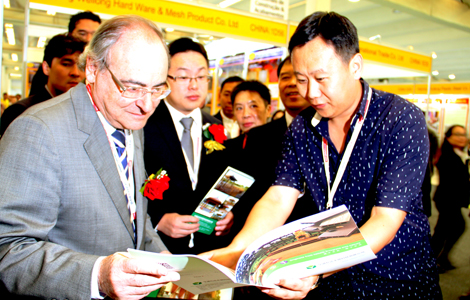
 Trade shows help firms to gain a foothold in Brazil
Trade shows help firms to gain a foothold in Brazil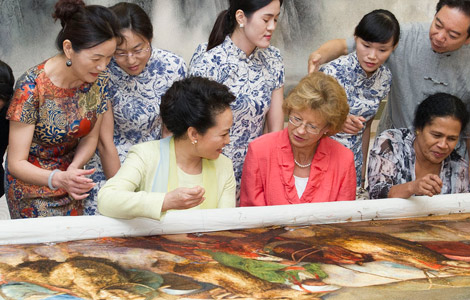
 First lady tours museum with wives of foreign leaders
First lady tours museum with wives of foreign leaders
Most Viewed
Editor's Picks

|

|

|

|

|

|
Today's Top News
China's US debt holdings dip lower, again
Anti-trust team lacks real muscle for enforcement
China bans US pork over additives
US police department uses Weibo to reach Chinese residents
March decries 'Occupy Central'
China to audit government land income in corruption fight
Macao's Chui unveils political platform for chief executive election
Ebola outbreak interrupts Chinese companies in Liberia
US Weekly

|

|






